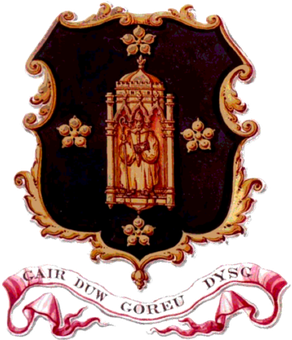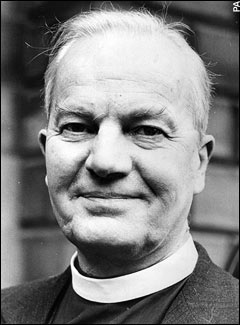Related Research Articles
Theology is the systematic study of the nature of the divine, or more broadly of religious belief. It is taught as an academic discipline, typically in universities and seminaries. It occupies itself with the unique content of analyzing the supernatural, but also deals with religious epistemology, asks and seeks to answer the question of revelation. Revelation pertains to the acceptance of God, gods, or deities, as not only transcendent or above the natural world, but also willing and able to interact with the natural world and to reveal themselves to humankind.

Jesus College is one of the constituent colleges of the University of Oxford in England. It is in the centre of the city, on a site between Turl Street, Ship Street, Cornmarket Street and Market Street. The college was founded by Elizabeth I on 27 June 1571 for the education of clergy, though students now study a broad range of secular subjects. A major driving force behind the establishment of the college was Hugh Price, a churchman from Brecon in Wales. The oldest buildings, in the first quadrangle, date from the 16th and early 17th centuries; a second quadrangle was added between about 1640 and about 1713, and a third quadrangle was built in about 1906. Further accommodation was built on the main site to mark the 400th anniversary of the college, in 1971, and student flats have been constructed at sites in north and east Oxford.

The University of Wales is a confederal university based in Cardiff, Wales. Founded by royal charter in 1893 as a federal university with three constituent colleges – Aberystwyth, Bangor and Cardiff – the university was the first university established in Wales, one of the four countries in the United Kingdom. The university was, prior to the break up of the federation, the second largest university in the UK.

University of Wales, Lampeter was a university in Lampeter, Wales. Founded in 1822, and incorporated by royal charter in 1828, it was the oldest degree awarding institution in Wales, with limited degree awarding powers since 1852. It was a self-governing college of the University of Wales from 1972 until its merger with Trinity University College in 2010 to form the University of Wales Trinity Saint David.
The neuroscience of religion, also known as neurotheology and as spiritual neuroscience, attempts to explain religious experience and behaviour in neuroscientific terms. It is the study of correlations of neural phenomena with subjective experiences of spirituality and hypotheses to explain these phenomena. This contrasts with the psychology of religion which studies mental, rather than neural states.

Sir Alister Clavering Hardy was an English marine biologist, an expert on marine ecosystems spanning organisms from zooplankton to whales. He had the artistic skill to illustrate his books with his own drawings, maps, diagrams, and paintings.

Alister Edgar McGrath is a Northern Irish theologian, Anglican priest, intellectual historian, scientist, Christian apologist, and public intellectual. He currently holds the Andreas Idreos Professorship in Science and Religion in the Faculty of Theology and Religion, and is a fellow of Harris Manchester College at the University of Oxford, and is Professor of Divinity at Gresham College. He was previously Professor of Theology, Ministry, and Education at King's College London and Head of the Centre for Theology, Religion and Culture, Professor of Historical Theology at the University of Oxford, and was principal of Wycliffe Hall, Oxford, until 2005.

Thomas Forsyth Torrance, commonly referred to as T. F. Torrance, was a Scottish Protestant theologian and minister. Torrance served for 27 years as professor of Christian dogmatics at New College, in the University of Edinburgh. He is best known for his pioneering work in the study of science and theology, but he is equally respected for his work in systematic theology. While he wrote many books and articles advancing his own study of theology, he also edited the translation of several hundred theological writings into English from other languages, including the English translation of the thirteen-volume, six-million-word Church Dogmatics of Swiss theologian Karl Barth, as well as John Calvin's New Testament Commentaries. He was a member of the famed Torrance family of theologians.
Paul Badham is professor emeritus of theology and religious studies at the University of Wales, Trinity Saint David. Educated at Reading School, Badham studied theology, religious studies and the philosophy of religion at Oxford and Cambridge universities, and received his PhD from the University of Birmingham. He trained for the Anglican Ministry at Westcott House and worked as a curate in Birmingham for five years before his appointment at Lampeter in 1973. He became a professor in 1991 and has served as head of department, head of school and dean of the Faculty of Theology. He was director of the Alister Hardy Religious Experience Research Centre from 2002 to 2010.
Swansea Metropolitan University is a former university based in Swansea, Wales, UK. The university merged with, and became a constituent campus of, the University of Wales Trinity Saint David on 1 August 2013.

David Frank Ford is an Anglican public theologian. He was the Regius Professor of Divinity at the University of Cambridge, beginning in 1991. He is now an Emeritus Regius Professor of Divinity. His research interests include political theology, ecumenical theology, Christian theologians and theologies, theology and poetry, the shaping of universities and of the field of theology and religious studies within universities, hermeneutics, and interfaith theology and relations. He is the founding director of the Cambridge Inter-Faith Programme and a co-founder of the Society for Scriptural Reasoning.
William Thomas Gibson is an Egnlish historian and professor who specialises in the history of religion in Britain in the early modern period.

Green Templeton College (GTC) is a constituent college of the University of Oxford in the United Kingdom. The college is located on the former Green College site on Woodstock Road next to the Radcliffe Observatory Quarter in North Oxford and is centred on the architecturally important Radcliffe Observatory, an 18th-century building, modelled on the ancient Tower of the Winds at Athens. It is the university's second newest graduate college, after Reuben College, having been founded by the historic merger of Green College and Templeton College in 2008.
Swansea Business School is a public research institution focusing on business studies and is situated in the city of Swansea, Wales, UK. It is based near the High Street at the Swansea Business Campus of the University of Wales Trinity St David and is part of the Faculty of Business and Management. It offers numerous undergraduate courses in Human Resources, Law, Accounting, Business and Finance, Business Management, Leadership, Marketing and Skills for the Workplace.
The Keston Institute is an organisation dedicated to the study of religion and communist countries, based in Oxford, England. It was founded in 1969 by the Revd Canon Michael Bourdeaux.

The University of Wales Trinity Saint David is a multi-campus university with three main campuses in South West Wales, in Carmarthen, Lampeter and Swansea, a fourth campus in London, England, and learning centres in Cardiff, Wales, and Birmingham, England.

David William Brown is an Anglican priest and British scholar of philosophy, theology, religion, and the arts. He taught at the universities of Oxford, Durham, and St. Andrews before retiring in 2015. He is well-known for his "non-punitive theory of purgatory, his defense of specific versions of social Trinitarianism and kenotic Christology, his distinctive theory of divine revelation as mediated fallibly through both tradition and imagination, and his proposals regarding a pervasive sacramentality discerned in nature and human culture alike."

Thomas Halliwell was the Principal of Trinity College Carmarthen in the middle part of the 20th Century.
Gordon Stevens Wakefield was a Methodist minister, academic and author.
References
- ↑ "Contacts, Alister Hardy Religious Experience Research Centre, Libraries and Centres, Learning Resources Centre; University of Wales Trinity Saint David". Archived from the original on 28 March 2012. Retrieved 5 September 2011.